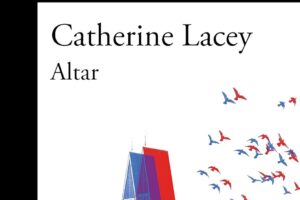
Original language: español
Year of publication: 2022
Valuation: between recommended and highly recommended
Gabriela, originally from Toluca, leaves her hometown to study accounting in Mexico City. Like many young people forced to make life decisions prematurely, she finds little pleasure in her career, attending classes more out of routine than interest. Her life takes a turn when she discovers, thanks to her cousin, a theater workshop that captivates her immediately (obviously, in large part thanks to her teacher). The novel begins with these forays by Gabriela into the world of theater, which leads her to question her “provincial” preconceptions of her. During this stage, her life passes relatively calmly, apart from the typical difficulties of any normal “study hunger.”
Connoisseurs of Alberto Chimal’s work will anticipate a turn towards the paranormal or fantastic, and so it happens. As the title suggests, a presence emerges from a kind of limbo (“the border”) to radically alter Gabriela’s existence, exposing her to certain murky secrets of the theater workshop and the social reality of her country. Temporality is crucial, placing the narrative in the early 1970s, a time marked by youthful disillusionment, the aftermath of student repressions, and a generational clash between conservatism and new ideas.
This novel has many elements that posed a risk of failure. Writing a novel about ghosts and possessions in a country plagued by violence, such as Mexico, entails the risk, on the one hand, of hurting susceptibilities, and on the other, of falling short. That the facts, no matter how paranormal they may be, do not surpass the real terror with which the inhabitants of the land of the maguey have to live. Why would anyone be interested in those souls that inhabit that limbo called “the border,” when there is a real border, a desert where women have the lowest life expectancy in the country? Why would anyone be worried about possession? of a girl for the lost soul of a murdered woman, when there are thousands of mothers terrified by the ghost of their daughters and sisters, and who will accompany them until they themselves, in one way or another, cross that border in turn? Perhaps approaching this topic from a girl’s point of view, and adding fantastic elements, is a way to deal with a situation that, otherwise, would be unsustainable (it’s hard to look reality directly in the face).
Although the tone of the novel is very reminiscent of what is usually classified as “youth literature,” characterized by adolescents in the midst of discovering themselves and antagonistic adults, Chimal manages the tone without falling into clichés, in such a way that he manages to address such a delicate topic (almost taboo in Mexico), such as violence against women and femicides.
That said, there are some points that I don’t like at all:
• The novel appears to be divided into two parts. The events that occur in the first half, focused mainly on Gabriela’s student life and her theatrical activities, lose relevance once paranormal events are introduced.
• The teacher of the theater workshop radically changes his character without an explanation, in my opinion, satisfactory, as if we had missed a chapter of his story. Later, certain aspects of his past are revealed that can explain such a transformation, but it gives the impression of being a retroactive justification of that change.
• It seems to me that the role of the protagonist loses strength once the fantastic elements occur, as if she gave up her place to another character. This is resolved at the end of the book, but in the meantime this exit from the scene is a bit shocking.
I really admire Chimal’s writing style, which is very reminiscent of his way of speaking. Even his tone of voice matches very well with the tone of his narration. Particularly enjoyable are the passages describing the activities of the theater group, the movement of bodies on stage, the sensations of the students, the perception of those observing, etc. I would dare to say that those beautiful passages alone make this book worth reading.
***********************************
Alberto Chimal was kind enough to give me a little of his time to talk in more detail about his novel. In addition, he reads us a small fragment. You can check it out at the following link.
* For those who wish to delve deeper into his methodology, Chimal offers a creative writing course on Udemy and on his website, as well as a YouTube channel with his wife, Raquel Castro, where they address various literary topics, highly recommended.
Source: https://unlibroaldia.blogspot.com/2024/04/resena-entrevista-la-visitante-de.html


